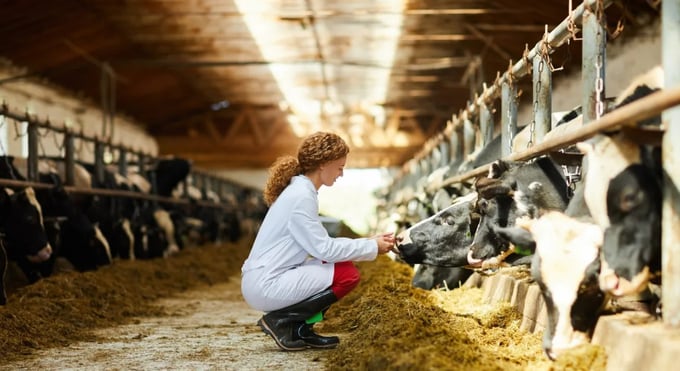June 17, 2025 | 11:20 GMT +7
June 17, 2025 | 11:20 GMT +7
Hotline: 0913.378.918
June 17, 2025 | 11:20 GMT +7
Hotline: 0913.378.918

Without enough food animal veterinarians and reliable access to the services they provide, 3.7 million livestock jobs are at stake, according to the report. Courtesy Photo
Veterinarians strengthen our domestic and global food supply — from the farm to the dinner table. They help ensure the health and welfare of animals that produce eggs, milk, meat, wool and other protein and fiber products. Timely veterinary care is key to detecting and preventing highly contagious animal diseases, as well as maintaining a healthy, safe food supply.
For years, rural communities have struggled with inadequate access to livestock and public health veterinarians. Shortages of these essential veterinarians can leave our food supply and farm animals at risk, all while weakening the nation’s critical animal health infrastructure. This impacts both animal and human welfare.
The number of United States Department of Agriculture-designated shortage areas continues to increase. In Fiscal Year 2024, we have the highest number of shortage areas ever, with 240 in 47 different states. These shortages jeopardize animal and public health, endanger the nation’s food supply and agricultural economy, and compromise our ability to prevent the introduction and spread of disease.
More than 80 percent of veterinarians graduate with educational debt that averages more than $185,000. This has a major impact on the ability to attract veterinarians to food animal or public health medicine, as these career opportunities typically pay less than companion animal practices. This earning disparity can make it financially difficult or even impossible for veterinarians to pursue food animal and public health careers.
We must act now to increase veterinary services in these underserved rural communities by incentivizing more food animal and public health veterinarians to practice in the areas most in need.
Given the urgency to fill these veterinary voids across the country, it’s time for Congress to pass the Rural Veterinary Workforce Act, which assists the USDA in the placement of veterinarians in designated shortage areas.
Established in 2003 by Congress, the Veterinary Medicine Loan Repayment Program (VMLRP) has been highly successful in helping place veterinarians in USDA-designated veterinary shortage areas by repaying up to $75,000 in educational debt in exchange for their service; however, unlike similar programs for physicians and other human health care providers, VMLRP awards are federally taxed. Currently, the USDA is required by law to pay the tax on behalf of the award recipient.
The bipartisan Rural Veterinary Workforce Act would simply end federal taxation on the program and allow more veterinarians to utilize the VMLRP and practice in USDA-designated shortage areas. Without this change, USDA must continue paying an additional 39 percent to the U.S. Treasury, on top of each loan repayment, reducing the number of shortage counties which can be addressed.
Since the VMLRP’s inception, it has helped establish 795 veterinarians in areas with veterinary shortages; meanwhile, over 2,000 applications have been received by the USDA. In 2023, the program’s applications exceeded available funding due to the then record-high 237 veterinary rural shortages in 47 different states. Enhancing and optimizing the VMLRP would allow the USDA to provide an additional award for every three awards currently made under the program without any additional appropriations.
Rural communities need and deserve ready access to veterinarians, which is why we are encouraging more veterinarians to join the rural workforce. Allowing more veterinarians to participate in the VMLRP would make a tremendous difference in addressing rural veterinary shortages throughout the country, help remove the financial obstacles blocking veterinarians who want to work in our underserved communities, and increase access to the essential services veterinarians provide nationwide.
Addressing this vulnerability in our nation’s first-class food safety system calls for a legislative solution. The Rural Veterinary Workforce Act paves the way to further address current rural veterinary shortages while maintaining animal and public health.
(The Hill)

(VAN) Extensive licensing requirements raise concerns about intellectual property theft.

(VAN) As of Friday, a salmonella outbreak linked to a California egg producer had sickened at least 79 people. Of the infected people, 21 hospitalizations were reported, U.S. health officials said.

(VAN) With the war ongoing, many Ukrainian farmers and rural farming families face limited access to their land due to mines and lack the financial resources to purchase needed agricultural inputs.

(VAN) Vikas Rambal has quietly built a $5 billion business empire in manufacturing, property and solar, and catapulted onto the Rich List.

(VAN) Available cropland now at less than five percent, according to latest geospatial assessment from FAO and UNOSAT.

(VAN) Alt Carbon has raised $12 million in a seed round as it plans to scale its carbon dioxide removal work in the South Asian nation.

(VAN) Attempts to bring down the price of the Japanese staple have had little effect amid a cost-of-living crisis.